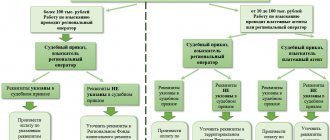Utility debt is one of the most common types of debt. In Soviet times, the debtor was influenced primarily morally, using the method of public censure. Now fines are used for this purpose.
Punishment in rubles can sometimes be very painful and unpleasant, while the size of a penny that has not been paid for a long time may exceed the size of the debt itself, so questions about how to cancel a fine if the debt has already been paid or how to challenge the amount specified in the claim always remain relevant .
Legal provisions
Many people want not to pay penalties on receipts received for housing and communal services. This desire may be based on a person's financial situation or a violation of his rights. However, a citizen must comply with the rules for using public utilities, since when purchasing living space, an agreement is signed with the housing and communal services, which includes the terms of service. In 2021, changes were published regarding the accrual of penalties and the statute of limitations for such cases was determined.
If there are any misunderstandings with the housing office, then you should write a letter of claim and fill it out correctly; the lawyers of our portal can help with this.
Only documentation can achieve the truth.
Regulatory acts
To get rid of debt, one desire is not enough. Housing Code of the Russian Federation No. 155 reports that a citizen is obliged to pay for utilities. These funds must be transferred to the balance sheet of the management organization in a timely manner in accordance with Article 153 of the Housing Code of the Russian Federation. And also deposit funds in accordance with charges and established tariffs (157 Housing Code of the Russian Federation). Penalties for housing and communal services can only be written off on the basis of the law. To do this, you need to draw up an application and submit it to the relevant authorities.
Situations are different, and if a person has a debt, this does not mean that he is a willful defaulter. By law, housing and communal services can forcibly recover this money through a lawsuit or offer an alternative. For this purpose, restructuring is envisaged, the forms of which will be discussed below.
By government decree, it was decided that suppliers of utility resources may refuse to provide services to those apartment buildings that do not pay. The issue can be resolved in court, according to Art. No. 350 of the Civil Code of the Russian Federation. This law provides grounds for taking tough measures. Article No. 317 of the Civil Code of the Russian Federation allows the calculation of penalties, and in the provisions of Art. No. 332 of the Civil Code of the Russian Federation states that in addition to penalties, the accrual of a penalty is allowed.
Note: authoritative legal publications such as Kommersant state that most of these laws are being revised and changes will be made in the near future.
Watch the video: “How to legally avoid paying housing and communal services debts.”
The COVID-19 pandemic has made adjustments to all areas of activity. Our sphere, the housing and communal services sector, is no exception. This includes mandatory disinfection of public places, and the abolition of penalties for housing and communal services, and online OSS, etc.
But the issue of debt collection from owners remains one of the most pressing today. What collection methods are legal and applicable in 2021?
Let us remind you that according to Art. 153 of the Housing Code of the Russian Federation, homeowners are required to pay utility bills on time and in full. At the same time, the code clearly regulates the terms of payment - until the 10th day of the month following the month for which the payment is made. Already from the 11th, the owner, in case of non-payment, is recognized as a debtor.
Measures of influence of management companies, homeowners' associations, housing cooperatives on defaulters depending on the duration of the debt:
Debt collection in 2021 and 2021 remains in the same regulations:
- Minimum debt
- if a tenant is a week or two late in paying utility bills, the servicer can simply remind the owner of current unpaid bills.
- Accumulation of debt up to 3 monthly payments
- a penalty is charged, and debtor entities are notified of the existence of unfulfilled monetary obligations. The accrual of penalties begins on the 31st day of late payment. If a person does not make a payment for more than 90 days, the amount of the penalty will be 1/130 of the Central Bank rate.
Important! According to Art. 155 ZhK for each day of delay a penalty is charged = 1/300 of the Central Bank rate on the day of payment repayment. The accrual of penalties begins from the 31st day of non-payment until the date of full payment of the debt.
- Debt is more than 6 months
- the management organization or HOA applies to the court, receives a writ of execution and submits it to the State Information System.
Last week, several requests to our Housing and Communal Services-Prof experts concerned the legality of power outages and demands for repayment of utility bills.
Let us remind you that due to the difficult epidemiological situation with the spread of coronavirus infection, the Government of the Russian Federation suspended for the period from April 6, 2021 to January 1, 2021 the rules on penalties for late or incomplete payment of housing, utilities, contributions for major repairs (Resolution of the Government of the Russian Federation dated 04/02/2020 N 424).
Thus, during the period of the moratorium, the right of the utility service provider to charge and require the consumer to pay penalties, penalties and fines is suspended. It is also prohibited to turn off electricity, gas, water and sewerage for debts, and to recognize the meter as out of order after the inter-verification period has expired. This position is also shared by the Supreme Court of the Russian Federation in its review dated April 30, 2020 on certain issues of judicial practice related to the application of legislation and measures to counter the spread of the new coronavirus infection (COVID-19) in the Russian Federation.
However, you need to understand that the relaxations in terms of payment for housing and communal services until the end of the year relate only to disconnections, the accrual and collection of penalties and penalties for debts and do not apply to the payments for utilities themselves.
Housing and communal services expert accountants-Prof will help you correctly accrue housing and communal services and calculate penalties. Extensive experience and knowledge of the regulatory framework gives them an undeniable advantage.
“Despite the fact that it is impossible to collect a penalty, the debt on the principal debt, without penalty, including that formed during the moratorium period, can be presented in a payment document, and also collected in court. Also, penalties incurred before April 6, 2021 or accrued after the end of the moratorium may be subject to collection,” this explanation was provided by the head of the Department of State Construction and Housing Supervision of the Republic of Sakha (Yakutia) Pavel Argunov.
If there is a debt and it is impossible to repay the debt at once, citizens are advised to contact the management company, homeowners association and housing cooperative with an application for an installment plan. In such cases, a bilateral agreement is concluded with a debt repayment schedule.
Debt collection and penalties
Despite the fact that until December 31, 2020, it is prohibited to collect penalties from debtor owners, as of January 1, 2021, it is legal to demand payment of not only the main debt, but also all penalties.
In January 2021, it will be necessary to accrue penalties on the entire amount of debt for corporate debt remaining as of December 31, 2020.
We advise you to notify the owners of residential and non-residential premises in the apartment building about this in advance - this will help increase the collection of payments for utilities and maintenance of the house.
A whole staff of Housing and Communal Services-Prof specialists, who work on the well-being of management companies, homeowners' associations and housing cooperatives as part of comprehensive services for management organizations, will not only organize billing for utility services, but also help increase the collection of payments.
For more information about comprehensive services for management companies, homeowners' associations and housing cooperatives, please call or email
Changes in accrual of penalties for utility bills in 2021
The changes that have already been approved mostly concern certain categories of citizens. For example, low-income families who are not able to fully pay off their utility debt for an apartment.
However, no one will allow them not to pay penalties for utilities at all, but some relief is provided in the form of subsidies. To avoid the accrual of penalties, citizens now have the opportunity to write an application to the Housing Office. If the department considers the reasons compelling, it may suspend penalties and grant a deferment of payment.
The tariffs for the services provided, as well as the accrued interest rate, have also changed. The statute of limitations now expires from the moment a person stops paying rent. Penalties begin to accrue only when funds stop arriving for more than 30 days.
Example: debt 5000 rubles. Penalties – 5,000*0.11*1/300 = 1.8 rubles. per day until a letter of claim is submitted or full or partial repayment is made.
Fining procedure
Unscrupulous users of CommBlag are financially liable for violating the terms of payment for the cost of services. However, the imposition of sanctions takes place in accordance with strict rules established in the Russian Housing Code.
Additional interest is charged from the defaulter according to the following algorithm:
- Sanctions are applied one month after the deadline for transferring the fee. For example, you need to pay for electricity for February before March 10. If the money has not been received by April 10, fines begin to accrue.
- Every day the amount increases by a fixed value.
- If the subject managed to pay for the utility bill within 90 days after the due date of payment, interest is accrued in the amount of 1/300 of the refinancing rate of the Central Bank of Russia, which is in effect at the time of repayment of the accrued debt.
- If the debtor does not meet the 90-day deadline, a different value is taken as the basis for calculations - 1/130th of the Central Bank rate.
- The creditor is not authorized to arbitrarily change the principles by which the amount of fines is determined.
Important! Such a mechanism is provided for in paragraph 14 of Art. 155 of the Housing Code, and it applies to rent and utility payments. The accrual of penalties for an Internet connection or cable television in a similar manner is unlawful, unless the agreement stipulates similar forms of responsibility of the parties.
Deadlines for payment of housing and communal services according to the law
In order to write off penalties for utilities and not wait for the moment when penalties begin to accrue, experts recommend paying off the debt within three months. There are several illegal ways of leveling, but this path will be wrong, because by the end of the reporting period the program will reveal errors in the balance sheet, and the audit will find the one whose debt is unpaid.
To avoid penalties, payment must be made within 30 days of receipt of the receipt. Otherwise, in addition to penalties, gas, water or electricity may be turned off.
Note: for the first 3 months the rate is 0.003%, then 0.013%.
Penalty for late payment of housing and communal services for individuals depending on the term of the debt
How are penalties calculated?
The moment of accrual of fines is specified in the Housing Code. According to this standard, payment must be made before the 10th day of the month following the billing period. From the next date, utilities have the right to charge a penalty.
Payment terms can be changed, but this is only permissible if they are stipulated in the agreement between the tenant and the service provider.
The accrual of penalties is an incentive to pay for services on time, which is very profitable and extremely necessary for utility companies. Management companies also benefit from the accrual of fines as an additional source of funds. And although the possibility of receiving them exists only from solvent clients, the mechanism for collection has been clearly worked out.
Responsibility and consequences for late utility payments
Utilities are obliged to provide services within the framework of the concluded contract, and citizens are obliged to pay for them. You can appeal or cancel penalties for utilities only if there is a serious reason. Otherwise, the resource supplying organization or management company has the right to sue the magistrates' court, and payment will have to be made with all fines according to the writ of execution.
Compulsory collection gives complete freedom to bailiffs. They are empowered not only to seize property, but also to describe household items and vehicles. A person may lose his home, which will be sold at auction and the premises will be provided to him minus the amount of debt.
A delay of more than 6 months is already considered a malicious administrative violation (Article 15.26.4 of the Code of Administrative Offenses of the Russian Federation).
Obligation by law to pay penalties for housing and communal services
Federal Law No. 188 dated January 22, 2019 covers the responsibilities of citizens to pay bills, and he cannot refuse or write off penalties on housing and communal services debts without good reason. The accrual of penalties can only be canceled if you send an application to the management company.
In a situation where such a measure has no effect, it is worth preparing a statement of claim. Only with this approach can one insist on recalculation or relaxation.
Grounds for not paying penalties on housing and communal services payments
A legal way to write off debts is an expired statute of limitations for penalties for utilities, a claim for incorrect accrual, or an order that a person is exempt from paying a penalty.
Practice shows that this can be achieved after the housing and communal services have admitted a mistake or on the basis of a court decision. Before taking any measures, you should have justified reasons - illegal fines, the management company did not provide receipts on time, etc.
If the property owner partially repays the debt or housing and communal services checks, then sanctions will not be assessed.
Grounds for cancellation of penalties:
- the statute of limitations has expired;
- death of the defaulter;
- bankruptcy of an individual.
Watch the video: “Collectors, write-off of penalties, new tariffs for housing and communal services.”
There are also private grounds in the form of installment plans and refinancing, but they can come into force only after filing an application and receiving a writ of order that will authorize these actions. The reduction of the penalty occurs only after the presentation of evidence about the disproportionality of establishing a penalty on the principal debt.
How to challenge a decision to impose a penalty
Practice shows that management companies often impose disproportionate penalties that exceed any reasonable limits. If the owner of the premises manages to discover this, he can act as follows:
- request a detailed calculation that served as the basis for charging such a large penalty;
- carry out independent calculations, comparing the results with the figures indicated in the payment slip (it is permissible to involve a competent specialist from the parties, for example, a practicing accountant or lawyer);
- write a statement to the Criminal Code, pointing out the discrepancies found (you must attach your own calculations to the letter;
- draw up and send a claim to the court if the application to the Criminal Code is ignored or its acceptance is refused.
Satisfaction of the claim means that the owner will be recalculated and the final amount he will have to pay will be reduced.
Options for reducing penalties on utility bills
You need to pay for the services of utility companies, but if it is not possible to pay off completely, you can consider several options for reducing the penalty. The debt will require partial repayment, but the owner has the right to try to negotiate a deferment with the management company.
The following factors influence this:
- the person has a difficult financial situation;
- the debt period is short.
Note: in order to write off penalties on utility bills in full, you will need a good reason (bankruptcy, death).
Partial reduction of penalties
You can get rid of penalties on utility bills, but first you need to suspend the accrual of interest. This is done by depositing funds in a partial amount. The amount of debt obligations will decrease and, accordingly, the amount of accrued interest will also change.
In this case, Article No. 333 of the Civil Code of the Russian Federation will help, but its provisions deal with the disproportionality of payments.
Receiving a subsidy
A subsidy option may be considered if the family is low-income or does not have a stable income. In this case, you need to obtain a decision on the assignment of benefits through government agencies. Only proven status will be taken into account in the new debt calculation.
What threatens a defaulter for housing and communal services?
Utility benefits do not allow you to completely get rid of debt, but they will make it much easier to pay. Not only low-income families, but also disabled people, single mothers and people with veteran's certificates can count on a 50% discount.
Regression
A court case is a lengthy process, so it should only be approached if a person is sure that the accrual is erroneous. But when the management company files an appeal, the owner can reduce the debt or reduce penalties through recourse. That is, at the expense of other people who are registered in the living space and also used the services of public utilities.
Installment plan
If you use installments, the debt will be written off according to the established schedule, the period of which is negotiated individually. To receive it, you need to write an application and if housing and communal services employees approve the application, then the entire amount of the debt will be divided into parts.
In this case, the increase in debt is suspended. Write-offs occur monthly, but only if the organization makes concessions.
Is the penalty legal, what will happen if you don’t pay it?
The penalty is charged on absolutely legal grounds, therefore there is no reason or opportunity not to pay it. There is no talk about the incompetence of applying it to a willful defaulter of utility services. Everyone is required to pay, but some citizens may try to write off the debt if the current situation falls into one of the following categories:
- the statute of limitations has expired (according to paragraph 1 of Article 196 of the Civil Code of the Russian Federation, it is 3 years);
- the debtor declared bankruptcy, his application was granted (all debts, including utility debts, are written off in this case);
- the penalty cannot be recovered within the framework of enforcement proceedings;
- the owner died, the organization was liquidated.
Sometimes the penalty can be reduced, but if you refuse to pay it, the amount of the fine will only increase.
Claim write-off of penalties
In order to reduce the debt on a claim, the application stage begins. With the help of a complaint, you will not be able to completely remove the debt, but you can significantly reduce the total amount.
If there is a basis for a complete write-off, it is worth preparing a letter and evidence base. The reason for non-payment is considered to be the death of the debtor, and the application must be submitted to the relatives of the deceased person if they do not intend to enter into the inheritance matter.
In case of bankruptcy, a citizen independently submits a claim paper.
Claim to housing and communal services for write-off of penalties
It is allowed to write an application to write off penalties for utility bills in free form.
However, there are several nuances that should be taken into account:
- Draw up a statement that the person demands the debt be cancelled, because the statute of limitations on the issue has expired.
- Create a request for partial repayment of the debt.
- Write an application for recalculation.
- File a claim with the prosecutor's office or court at your place of residence.
Please note: the forms must be filled out without errors or crossed out. At the end of the text is a list of attached documentation.
Application to the prosecutor's office for the accrual of penalties for housing and communal services
The law allows you to file a complaint with the prosecutor’s office, but you should not expect that debts will be canceled immediately. Employees of this department need reasons. For example, illegal charges on the part of the management company.
The application must clearly show:
- reason for contact;
- provide personal information and contact information;
- provide justifications and evidence base on the basis of which agency employees should conduct an inspection.
The supervisory authority has exactly one month from the date of receipt of the complaint to respond.
A sample complaint to the prosecutor's office is available for download here.
Writing off penalties for housing and communal services through the court
Many argue that it is easier to pay utility bills than to go to the courts. Despite this, there is a chance to eliminate the debt if the defaulter proves he is right. Once the application is submitted, the process cannot be stopped.
Stages of the proceedings:
- collection of evidence;
- direction of claim;
- court hearing;
- making a decision.
If the verdict is positive, then the person will be released from paying the penalties that have been accrued all this time.
Correctly drawing up an application is 50% of success. If there is evidence, the owner will easily restore justice. You can sue for the costs spent on the production and organization of litigation, as well as demand compensation for moral damage.
Sample statement of claim for a reduction in the amount of penalties when paying for utilities
The consumer can write a statement not to cancel, but to reduce the percentage of the penalty. This must be done before the utility company files a lawsuit and the collection process is initiated. You should contact the authority at your place of residence.
Such an application may be met with objections from utility services. They will carefully study: the amount of debt, the time of delay and the person’s financial situation.
Statute of limitations
The statute of limitations is three years – this is stated in Article No. 196 of the Civil Code of the Russian Federation. It is during this period that it is realistic to file claims. But time does not matter if the property owner can provide evidence that the deadline was missed for a good reason.
Comments of the Supreme Court of the Russian Federation on the possibility of writing off penalties for housing and communal services
The Supreme Court commented on the situation with the write-off of penalties. Statement published June 17, 2021. It states that a citizen has the right not to pay for housing and communal services if there are doubts about the legality of the charges. The decision is due to the fact that the public utility system is increasingly unstable. People often receive receipts with unrealistic amounts and, accordingly, overpay.
Judicial practice of collecting penalties
If you do not apply and do not try to resolve the issue pre-trial, then Article No. 199 of the Criminal Code of the Russian Federation comes into force. The willful defaulter will be punished.
An example from judicial practice
Utility workers filed a lawsuit against citizen O.V. Popov. – the amount of debt for four years of non-payment of housing and communal services amounted to 56,400 rubles. Interest was accrued on top for penalties and forfeits and 12,300 rubles were added to the amount of debt.
The owner of the apartment protested this debt, citing the fact that the statute of limitations had already expired. The court decided to collect money only for the last three years, which allowed to reduce the amount of debt by almost half.
How to write an application to reduce penalties
The claim to the court consists of the following parts:
- header (information about the court, the plaintiff and the defendant, in this case the Criminal Code);
- full name of the claim (“petition to reduce penalties”);
- main part (describe the plaintiff, defendant in more detail, indicate the name of the court, talk about the subject of the dispute);
- requirements (the plaintiff indicates by what amount, in his opinion, the fine can be reduced).
Documents confirming the information contained in it are attached to the claim.








